Howard`s End .. will Stephen Harper`s hero go down in the election down under .. (yes he did)
Oct 28th, 2007 | By Greg Barns | Category: Countries of the World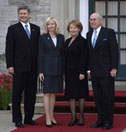 [UPDATED NOVEMBER 25]. John Howard admires Stephen Harper, and Stephen Harper admires John Howard. The love-in between the Australian and Canadian prime ministers has been going on for while now. Mr. Howard loaned Mr. Harper some of his key strategists before the 2006 Canadian federal election. And both leaders have bestowed on the other the rare privilege of addressing their respective parliaments. Mr. Harper sees in Mr. Howard a conservative politician who has been able to reshape his country, and win three successive elections by appealing to lower income conservative voters who normally vote for centre left parties. But now is the time for Mr. Harper and his advisers to take careful note of how even the most canny politicians can come unstuck. Mr. Howard is facing electoral defeat when Australians go to the polls on November 24, despite the fact that the nation’s economy is booming, and that Mr Howard launched his campaign by announcing substantial tax cuts for families. For Stephane Dion and the Liberals the surprising success so far of the man who is challenging Mr. Howard for the prime ministerial mantle, Australian Labor Party (ALP) leader Kevin Rudd, should also offer some clues on how to unseat Mr. Harper, whenever voters next trudge to the polls in Canada.
[UPDATED NOVEMBER 25]. John Howard admires Stephen Harper, and Stephen Harper admires John Howard. The love-in between the Australian and Canadian prime ministers has been going on for while now. Mr. Howard loaned Mr. Harper some of his key strategists before the 2006 Canadian federal election. And both leaders have bestowed on the other the rare privilege of addressing their respective parliaments. Mr. Harper sees in Mr. Howard a conservative politician who has been able to reshape his country, and win three successive elections by appealing to lower income conservative voters who normally vote for centre left parties. But now is the time for Mr. Harper and his advisers to take careful note of how even the most canny politicians can come unstuck. Mr. Howard is facing electoral defeat when Australians go to the polls on November 24, despite the fact that the nation’s economy is booming, and that Mr Howard launched his campaign by announcing substantial tax cuts for families. For Stephane Dion and the Liberals the surprising success so far of the man who is challenging Mr. Howard for the prime ministerial mantle, Australian Labor Party (ALP) leader Kevin Rudd, should also offer some clues on how to unseat Mr. Harper, whenever voters next trudge to the polls in Canada.
Climate change and the political climate …
 So why is John Howard on the skids? There are a number of factors at work here. First, there is Mr. Howard’s age. He is 68 and has indicated that if reelected to office he will step down after 18 months to make way for his heir and successor, the Treasurer (Finance Minister) Peter Costello. Coupled with the issue of his own age, his government has been in office now for 11 years. It is third longest serving government in Australian federal history. So there’s a sense of its time for a change’ in the electorate.
So why is John Howard on the skids? There are a number of factors at work here. First, there is Mr. Howard’s age. He is 68 and has indicated that if reelected to office he will step down after 18 months to make way for his heir and successor, the Treasurer (Finance Minister) Peter Costello. Coupled with the issue of his own age, his government has been in office now for 11 years. It is third longest serving government in Australian federal history. So there’s a sense of its time for a change’ in the electorate.
Neither of these are factors about which Mr Harper, almost 20 years Mr Howard’s junior, and leading a government that has been in office less than two years, needs to concern himself. But then there is the issue of climate change and here Mr Harper and Mr Dion ought to take careful note of Australian developments and the mood of the electorate.
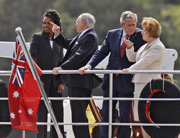 Like Mr. Harper, Mr. Howard does not like the Kyoto Protocol, which binds countries to reducing greenhouse gas emissions. It is fair to say that neither Mr. Harper nor Mr. Howard is a fan of Al Gore’s view of the climate change challenge. And both Mr Harper and Mr Howard have signed up for the Bush Administration’s Kyoto alternative,’ the Asia-Pacific Partnership, which enables countries to meet climate change issues by taking account of their own countries’ requirements. As in Canada, Australia’s resource sector is a major investor and employer, and Mr. Howard has pledged that he will not allow Australia to sign the Kyoto Protocol because this would have disastrous consequences for the multi-billion dollar coal industry.
Like Mr. Harper, Mr. Howard does not like the Kyoto Protocol, which binds countries to reducing greenhouse gas emissions. It is fair to say that neither Mr. Harper nor Mr. Howard is a fan of Al Gore’s view of the climate change challenge. And both Mr Harper and Mr Howard have signed up for the Bush Administration’s Kyoto alternative,’ the Asia-Pacific Partnership, which enables countries to meet climate change issues by taking account of their own countries’ requirements. As in Canada, Australia’s resource sector is a major investor and employer, and Mr. Howard has pledged that he will not allow Australia to sign the Kyoto Protocol because this would have disastrous consequences for the multi-billion dollar coal industry.
But, and here’s where it gets interesting from Mr. Harper and Mr. Dion’s perspective, climate change really is no longer an environmental side issue in Australian politics. To borrow and update a memorable phrase from former Australian Prime Minister and Treasurer, Paul Keating, “Walk into any pet shop around Australia and the resident Galah [a native Australian bird] will be talking about climate change.” A severe drought in south-eastern Australia – the worst in a thousand years – and the prospect of diminishing water supplies as temperatures rise over the course of the next fifty years has focused the average Australian on climate change, and the need for government to show leadership in tackling it.
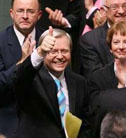 Mr. Howard has been caught napping on the issue. He should have, as his Environment Minister Malcolm Turnbull urged him to do as recently as three weeks ago, done a u-turn and signed Australia up to Kyoto. By doing that he could have taken the issue off the table. But instead Mr. Howard’s stubbornness has allowed Mr Rudd and the ALP to position themselves as being more in touch with the community in understanding the urgency of tackling climate change.
Mr. Howard has been caught napping on the issue. He should have, as his Environment Minister Malcolm Turnbull urged him to do as recently as three weeks ago, done a u-turn and signed Australia up to Kyoto. By doing that he could have taken the issue off the table. But instead Mr. Howard’s stubbornness has allowed Mr Rudd and the ALP to position themselves as being more in touch with the community in understanding the urgency of tackling climate change.
In short, take note Stephen Harper. As the consequences of climate change begin to manifest themselves in Canada too, the community may well demand that their federal government distance itself from people like Mr. Howard and President Bush, and put Canada at the international forefront on this issue. Mr. Dion, who has already painted himself very green, should take some heart from Mr. Rudd’s success on climate change – which can be packaged easily for the average voter to digest and understand.
No monopolies on economic management nowadays …
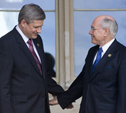 Then there is the issue of economic management – and the fact that the electorate now takes it for granted that either side of the political spectrum is competent in this regard. Mr. Harper, when he addressed the Australian Parliament last month, urged Australian voters not take good economic management for granted. In other words, don’t throw out Mr. Howard because you might regret it if there is an economic downturn under Mr. Rudd and an ALP government. That was the gist of Mr Harper’s undiplomatic gesture to help out his friend.
Then there is the issue of economic management – and the fact that the electorate now takes it for granted that either side of the political spectrum is competent in this regard. Mr. Harper, when he addressed the Australian Parliament last month, urged Australian voters not take good economic management for granted. In other words, don’t throw out Mr. Howard because you might regret it if there is an economic downturn under Mr. Rudd and an ALP government. That was the gist of Mr Harper’s undiplomatic gesture to help out his friend.
But what Mr Harper is forgetting is that voters in both Australia and Canada don’t believe there is much difference between at least their major political parties and their leaders these days on economic management. As in Canada, there is now a generation of voters in Australia who have known nothing else except strong economic growth. Australia emerged from a vicious recession in 1993 and has never looked back. Canada has had a similar experience, with its economic recovery dating from 1995.
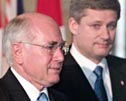 The average voter is also economically literate enough these days to understand that the driving forces for economies such as Canada’s and Australia’s are the US, China, India, and to a lesser extent these days Japan. Canadians and Australians understand that national governments in their countries can only do so much to control economic life in the 21st century.
The average voter is also economically literate enough these days to understand that the driving forces for economies such as Canada’s and Australia’s are the US, China, India, and to a lesser extent these days Japan. Canadians and Australians understand that national governments in their countries can only do so much to control economic life in the 21st century.
In fact, there a consensus on economic matters between the main conservative and progressive parties in both Australia and Canada. The Conservatives and the Liberals in Canada, and the ALP and the Liberal-National coalition in Australia are fully signed up members of the economic liberalism and open-market economies club. The differences between Mr. Harper and Mr. Dion or Mr. Howard and Mr. Rudd on economic management are more about style than substance.
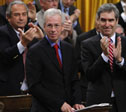 In short, there is little risk to the voters’ hip pocket in changing horses. That’s why Mr Howard’s daily claim in this election campaign to be the architect of Australia’s economic prosperity is falling on deaf ears. Voters don’t fear Mr Rudd and the ALP. There’s an instructive lesson for Stephen Harper here – banging on about good economic management is just not as potent an electoral weapon as it was say 20 years ago. (And which party started Canada’s current burst of prosperity back in 1995 anyway?)
In short, there is little risk to the voters’ hip pocket in changing horses. That’s why Mr Howard’s daily claim in this election campaign to be the architect of Australia’s economic prosperity is falling on deaf ears. Voters don’t fear Mr Rudd and the ALP. There’s an instructive lesson for Stephen Harper here – banging on about good economic management is just not as potent an electoral weapon as it was say 20 years ago. (And which party started Canada’s current burst of prosperity back in 1995 anyway?)
On this coming Saturday, November 24 Mr. Howard might be returned to office in Australia, despite the god-awful opinion polls which have his government trailing the ALP by between 10 and 12 points. He is a canny politician and there are still three weeks to go in this election campaign. But so far it is not looking promising. And if Mr Howard does lose in many respects he will only have himself to blame. Take note Stephen Harper – the man down under upon whom you have bestowed hero status may have feet of clay after all.
 Greg Barns was a political adviser to the Howard government from 1996 to 1999 and is a regular commentator in Canada on Australian politics.
Greg Barns was a political adviser to the Howard government from 1996 to 1999 and is a regular commentator in Canada on Australian politics.
His recent Canadian appearances include CBC Radio and the Toronto Globe and Mail. He also comments on Australian politics in Australia and other parts of the global village, most recently in the Melbourne Age and the South China Morning Post.
CW EDITORS’ UPDATE: Just before the November 24 election, former Australian prime minister Paul Keating (who Greg Barns particularly admires) advised his fellow citizens: “When things become errant, a wise country … understands that it is being granted an appointment with history …this coming Saturday, this country should take that opportunity by driving a stake through the dark heart of Howard’s reactionary Government.” As it happened, the country took his advice, and Kevin Rudd’s Labour Party won handily.
 For further details see a report from The Age from Melbourne, and an Associated Press report from the SFGate website in the San Francisco Bay Area. The first few sentences of the AP report do a tidy job of summarizing what happened from the standpoint of the USA: “Conservative Prime Minister John Howard, one of the Bush administration’s staunchest allies, suffered a humiliating election defeat Saturday at the hands of an opposition leader who has vowed to pull troops out of Iraq … Labor leader Kevin Rudd, a Chinese-speaking former diplomat, has also promised to sign the Kyoto Protocol on global warming …” Canadian readers will no doubt still find Mr. Barns’s reporting before the fact above quite helpful in assessing the implications for Canada today.
For further details see a report from The Age from Melbourne, and an Associated Press report from the SFGate website in the San Francisco Bay Area. The first few sentences of the AP report do a tidy job of summarizing what happened from the standpoint of the USA: “Conservative Prime Minister John Howard, one of the Bush administration’s staunchest allies, suffered a humiliating election defeat Saturday at the hands of an opposition leader who has vowed to pull troops out of Iraq … Labor leader Kevin Rudd, a Chinese-speaking former diplomat, has also promised to sign the Kyoto Protocol on global warming …” Canadian readers will no doubt still find Mr. Barns’s reporting before the fact above quite helpful in assessing the implications for Canada today.

